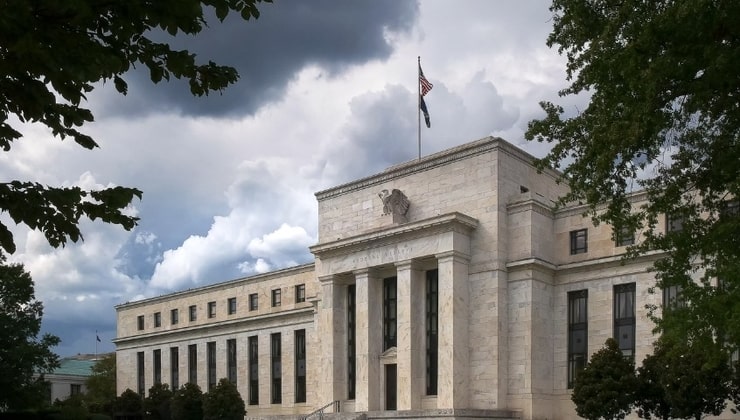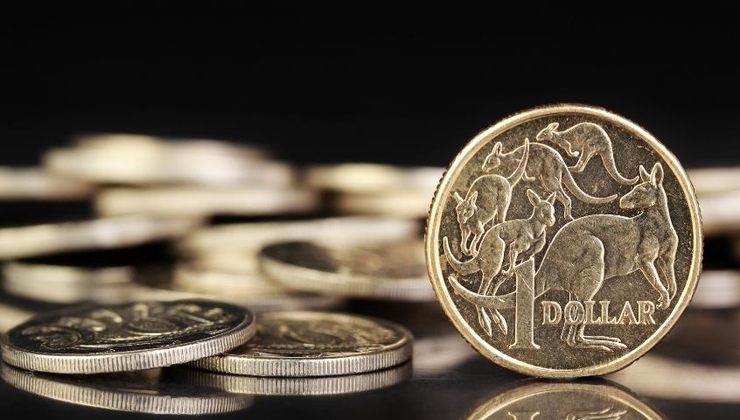CFDs are complex instruments and come with a high risk of losing money rapidly due to leverage. 80% of retail investor accounts lose money when trading CFDs with this provider. You should consider whether you understand how CFDs work and whether you can afford to take the high risk of losing your money.
- English
- 简体中文
- 繁体中文
- ไทย
- Tiếng Việt
- Español
- Português
- لغة عربية
Dollar Index (DXY):
The dollar’s movement was suppressed as traders didn’t want to initiate any fresh positions prior to the FOMC meeting. The initial reaction of markets was choppy price action, then Jerome provided a dovish bone for traders to chew on when he stated a 75bps increase is not something the committee is actively considering. This led to a flurry of sell orders hitting the dollar with risk assets seeing robust demand with the VIX getting crushed. Additionally, the 2s10s yield curve steepened as the 2-year yield declined by over 10bps. The unanimous vote for a 50bps hike without a dissent by Bullard for 75bps could also have been interpreted dovishly by the market.
The risk was always skewed on the dovish side considering how hawkish the market was positioned prior to the meeting. Quantitative tightening could also have been described as “gentle” with a monthly cap of $47.5bln (30 17.5 split to Treasuries and MBS respectively) on runoffs being implemented from June 1, rising to $95bln after 3 months. We got a further update on where Powell believes the neutral rate is, between 2% and 3%. In terms of the rate path going forward he believes 50bps should be on the table at the next few meetings, likely to be followed by 25bps hikes thereafter. Inflation was brought up again with Powell stating it was way too high, but also concluding that there is some evidence of core PCE peaking and that there won’t be a wage price spiral. Lastly, the new buzz word on the street “soft landing” came up, with Powell believing the Fed have a good chance of engineering this outcome.
Thursday pulled a complete 180 and the dollar soared on the back of the 10-year US yield breaching the 3% mark. Real yields also exploded higher. Risk assets were a bloodbath with the VIX spiking higher. How we finish up into the weekend will depend on the NFP report.
Services PMI data beat expectations, but declined from last month’s figure, while non-manufacturing PMI numbers were below both the forecast and previous months’ number. With the last big event of the week out today, Non-Farm Payrolls (+391k exp), ADP data disappointed expectations coming in just shy of 250k. Initial jobless claims came in higher than the 180k expected at 200k. The key metric within the NFP report in my opinion will be average hourly earnings, forecast to print at 5.5% YoY – if that is the number it would actually signify a decline on last month’s figure. If we see a punchy print could it push yields and the dollar higher on a higher number than expected?

(Source: TradingView - Past performance is not indicative of future performance.)
DXY is sitting around the March 2020 covid highs with the RSI hovering just below overbought territory. The 21-day EMA has been acting as a nice little dynamic support line. I’ve drawn in a horizontal resistance line around the 103.8 level, where DXY seems to be finding sellers. On the upside 105 seems the most logical target if we break that aforementioned resistance, while on the downside a break of 103 could see price move towards this week’s low of 102.2
EURUSD:
There was a spate of ECB speakers this week who now all seem to be comfortable with a July rate hike. More influential members of the ECB such as Schnabel believes bond purchases could be ended in June with a rate hike in July to follow. She also stated that the ECB’s primary job is to control inflation as opposed to supporting the economy. She may live to regret those words. ECB’s Chief Economist Lane spoke on Thursday and believes the euro area is unlikely to revert back to the below trend inflation we saw pre-pandemic. The market currently is pricing in 18bps for the July meeting and just shy of 50bps for September. This lifts to circa 90bps by December.
Data wise eurozone retail sales disappointed, missing estimates by an entire percentage point. This indicates the consumer is spending conservatively which aligns with the fall in consumer confidence to -22. Eurozone final services PMI numbers printed in line with consensus expectations and was higher than last month’s figure. The oil embargo announced by the EU could be a drag on growth and this is another negative for the single currency. Unfortunately for euro bulls the dollar flexed its muscles on Thursday and the euro couldn’t withstand its force.

(Source: TradingView - Past performance is not indicative of future performance.)
Price tried to move through the 23.6% Fibonacci level but was hit lower as the dollar surged yesterday. 1.05 is absolutely key, a break below there does make parity a reality. On the upside I’d be looking for moves back into the 23.6% Fib level around 1.064/5. The RSI has managed to climb out from oversold.
GBPUSD:
The pound had begun the week mixed and then surged in the wake of a dovish Fed meeting, however, Thursday was a very very bad day for Cable due to the combination of risk-off and a dovish BoE meeting. The initial policy decision was actually skewed on the hawkish side as rates were raised by 25bps to 1% (the vote split showed 3 MPC members actually wanted a 50bps hike with the other 6 satisfied with the 25bps move). This was quickly overshadowed by some ominous economic forecasts based on market rates 1) a collapse in GDP by circa 1% occurring in Q4 2022 and a 0.25% decline over 2023. 2) inflation peaking around 10.2% in October this year as the energy price cap rises by roughly 40% 3) unemployment climbing to 5.5% by 2025.
Guidance on the rate path going forward was tentative as most members judged that some degree of further tightening in monetary policy might still be appropriate in coming months, but two MPC members saw guidance for more rate hikes not being appropriate given the current balance of risks. Further cementing the dovish nature of this meeting, the BoE’s forecasts for inflation based on market rates sees inflation falling below target (2%) between Q2 and Q3 of 2024 as well as declining to 1.3% by the end of their forecast horizon (February’s forecast was 1.6%). This really does send a strong signal to the market that their expectation of the bank rate moving to 2.5% by mid-2023 is far too aggressive. Bailey even remarked during the press conference “we disagree with those who believe interest rates should be raised much higher.” 2-year gilts (proxy for BoE bank rate) sold off, with yields slumping by 25bps at one point throughout the session. Given the bank rate reached 1%, the threshold for quantitative tightening, the MPC have asked bank staff to work on a strategy for gilt sales – they’ve pledged to provide an update in August. GBPUSD has been sent to the A&E and is now sitting at levels last seen in June 2020. I think max we see a further two 25bps rate hikes then a pause. Although rates have come off, it’s still too punch with just shy of 6 hikes priced through to March 2023.
We also received some council election results with the Conservatives losing 92 seats along with their flagship councils Wandsworth, Barnet and Westminster. Clearly voters haven’t forgotten Boris Johnson’s antics.

(Source: TradingView - Past performance is not indicative of future performance.)
Some big technical damage on the GBPUSD chart as price probes the 1.225 support with 1.20 not far off. I think cable now looks like it could be a vehicle for shorting rallies. Moves into 1.25 could be a potential zone for this.
USDJPY:
Japan news flow has been on the light side this week. Similarly to other currencies above, USDJPY has been driven by developments state side. As the US 10-year yield slid from its high of 3%, USDJPY followed in close pursuit. The Fed meeting was seen as dovish, sending US yields lower as a result. This was quickly reversed on Thursday as the 10-year breached the 3% level on the upside. NFPs out later today could cause some further excitement in the bond space, which could be expressed through USDJPY.

(Source: TradingView - Past performance is not indicative of future performance.)
USDJPY looks to have made a bull flag pattern which is music to the ears for bulls. The RSI still has room to run before extreme overbought fears creep in. On the upside the 132 mark (just above the 28 April high) would be a good initial target. On the downside 128.8 would be a good level to monitor for pullbacks.
Gold:
The yellow metal started the week off slipping into red territory as real yields climbed higher as well as a moderately stronger dollar. Prior to the Fed meeting, price but in a bottom around the $1850 and found some buyers. Then the dovish Fed meeting took place - providing a very strong tailwind for gold. Real yields slipped as nominals nosedived. Today’s NFP figures could be another event risk for this asset.

(Source: TradingView - Past performance is not indicative of future performance.)
The 21-day EMA seems to be keeping rallies capped as price touches this shorter term moving average. $1850 seems to be key as price put in a temporary bottom here. The 200-day SMA beckons at $1830. The RSI is a bit in no man’s land unfortunately. On the upside $1900 would be important for price dynamics.
Crude Oil:
Crude oil has been on a steady footing for a variety of reasons. On Tuesday the EU decided to press ahead with an oil embargo phasing out Russian supply within 6 months and refined products by the end of the year. Although, there will be exemptions and it needs to be passed, this is quite a significant step. Additionally, the Fed meeting on Wednesday informed the market that the US economy remains robust and Powell should be able to engineer a soft landing. This should alleviate additional demand destruction fears which are already emanating from China’s lockdowns.
The OPEC+ meeting failed to throw any curveballs at oil traders with a 432k/bpd increase decided upon for June. The next meeting will take place on June 2. Iran US nuclear talks remain gridlocked with no new breakthroughs keeping supply in check. US inventory data showed just over a 1mln barrel build vs the expected 200k drawdown. There’s also been some significant developments out of the US. Biden announced he was seeking to replenish the US’s strategic petroleum reserves by buying 60mln barrels. Additionally, the US Senate passed the “NOPEC” bill which could be enforceable against OPEC producers over price collusion practices. However, before this bill can actually have any teeth it needs to be passed into US law. Unfortunately, price gains in crude were reversed Thursday as risk assets were dumped as yields and the dollar soared. Today’s NFP could see more risk-off behaviour which could hit crude further.

(Source: TradingView - Past performance is not indicative of future performance.)
Technically, price has broken to the upside of the descending flat-sided triangle. Price is now emerging above resistance in the form of the 38.2% Fibonacci level as well as remaining above the 50-day SMA. The RSI is in no man’s land but still has plenty room to run before overbought concerns become an issue. The levels to the upside I’d be keeping an eye on would be $115, $120 and $125. This is where price has found resistance previously. On the downside, $110 is key.
Related articles
Ready to trade?
It's quick and easy to get started. Apply in minutes with our simple application process.
The material provided here has not been prepared in accordance with legal requirements designed to promote the independence of investment research and as such is considered to be a marketing communication. Whilst it is not subject to any prohibition on dealing ahead of the dissemination of investment research we will not seek to take any advantage before providing it to our clients. Pepperstone doesn’t represent that the material provided here is accurate, current or complete, and therefore shouldn’t be relied upon as such. The information, whether from a third party or not, isn’t to be considered as a recommendation; or an offer to buy or sell; or the solicitation of an offer to buy or sell any security, financial product or instrument; or to participate in any particular trading strategy. It does not take into account readers’ financial situation or investment objectives. We advise any readers of this content to seek their own advice. Without the approval of Pepperstone, reproduction or redistribution of this information isn’t permitted.
.jpg)


